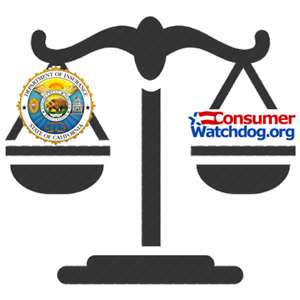 The left-leaning advocacy group Consumer Watchdog continues its fight involving public records act requests asking the California Department of Insurance for records pertaining to meetings and writings with and between Applied Underwriters’ executives and lobbyists on the one hand and Commissioner Ricardo Lara and CDI officials on the other.
The left-leaning advocacy group Consumer Watchdog continues its fight involving public records act requests asking the California Department of Insurance for records pertaining to meetings and writings with and between Applied Underwriters’ executives and lobbyists on the one hand and Commissioner Ricardo Lara and CDI officials on the other.
Now it asks the Second District Court of Appeal to set aside a trial court’s finding that CDI’s public records search was reasonable. It is seeking an order to force the Department to expand its records search to include documents related to four individuals who were representing Applied Underwriters or its subsidiaries.
The Los Angeles County Superior Court in January issued an order granting Consumer Watchdog a narrow victory in the form of an unredacted copy of a California Department of Insurance calendar entry but largely rejected the rest of its request for an order requiring additional searches. “In all other respects, the petition is denied,” the court wrote (for past coverage, see Limited Victory…).
The documents dispute is linked to the alleged pay-to-play scandal that rocked Insurance Commissioner Ricardo Lara’s first term. The Commissioner accepted roughly $54,000 in campaign contributions from individuals found to have connections with Applied. Lara eventually returned the money after the source became public knowledge. Consumer Watchdog filed public records requests for documents and calendar entries related to Applied’s campaign to win Departmental approval for its buyback of California Insurance Company.
On Appeal
Consumer Watchdog maintains that the trial court’s ruling violates the maxim that the California Public Records Act must be “broadly construed” to ensure public access to records. The CPRA was enacted in 1968 and later strengthened by a 2004 voter initiative.
“Rather than considering whether the Department’s search and production was reasonable in light of the knowledge of the agency as a whole, the court improperly narrowly construed the CPRA by determining the issue of reasonableness through the prism of the handful of individuals at the Department of Insurance responsible for responding to CPRA requests,” Consumer Watchdog argues. “However, by statute, the CPRA applies to the Department as a whole, not just the CPRA Unit.”
The appeal maintains that the CPRA unit identified 37 individuals at the Department that may have relevant records related to the four companies identified in the records request. When these individuals were contacted, however, it says they were never asked if they had records for other individuals “employed by or representing” Applied and its affiliates.
“To be clear, the provision of the CPRA Requests seeking records of communications and meetings with ‘any individuals employed by or representing’ the companies was critical because there was no way for Petitioner to know all the individuals or lobbying firms representing the companies,” Consumer Watchdog says, maintaining that the Department was in the best position to know this because they were also in the meetings. “This reality is why the CPRA requires that records sought need only be ‘reasonably described’ in the request.”
Follow-Up Searches
The appeal also maintains that the lower court erred by concluding that the Department or any other state agency need not follow up on clear leads suggesting the probable existence of other responsive documents. The trial court held that the CPRA does not require this.
“In fact, courts interpreting public records acts have required agencies to follow up on leads uncovered in the course of a search precisely because doing so is ‘reasonable,’” the petition maintains. “In other words; the duty to follow up on clear leads uncovered during a search is an inherent component of the statutory requirement to conduct a ‘reasonable search’ for responsive records, because following up on a clear lead is itself reasonable.”
The petition indicates that the Department’s search produced records showing that Eric Serna and Jamie Sahara did or very likely did represent Applied during the times in question. Both were listed in documents produced under the request as a contact for various meetings with Applied’s leadership or was the person requesting the meeting between the Department and Applied executives. The Department, however, failed to include either Serna’s or Sahara’s names in its searches for responsive records.
The group is asking the Second District to return the case to the Superior Court to determine if the Department failed to follow up on “clear leads” that other responsive documents probably existed at the Department. The issue was still pending as of this publication’s deadline.
Applied Underwriters was once but is no longer an affiliate of Berkshire Hathaway. Applied’s management bought it. Berkshire Hathaway bears no responsibility for any of the events which have transpired involving Applied Underwriters’ or its subsidiaries including California Insurance Company.

